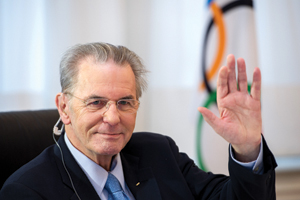When Dick Pound ran for president of the International Olympic Committee in 2001, he rarely traveled. His campaign depended primarily on phone calls to members and brief meetings at IOC gatherings.
Twelve years later, the campaign for IOC president looks far different. The six competitors — among whom a new president will be selected on Sept. 10 in Buenos Aires, Argentina — have traveled to New York to visit the United Nations, several went to the Ivory Coast for the Association of National Olympic Committees of Africa, and they all were in Switzerland for an IOC gathering in July.
 |
Jacques Rogge is only the eighth president in the IOC’s nearly 120-year history.
Photo by: GETTY IMAGES
|
“The traveling and mixing of the candidates is much greater than it was in 2001,” said Pound, an IOC member from Canada since 1978. “I didn’t have money to spend traveling to Europe and Asia and Africa to pick up votes. It wasn’t there. Clearly, somebody is funding the process for some of the candidates. Some are wealthy enough to do it on their own. Some are not. It’s a different race.”
The presidential race is only the third one the IOC has held in the last three decades. Juan Antonio Samaranch led the organization from 1980 until 2001, and Jacques Rogge beat out four competitors to replace Samaranch in 2001. Rogge is the eighth president in the organization’s nearly 120-year history.
The candidates to replace him are Thomas Bach of Germany, Sergey Bubka of Ukraine, Richard Carrión of Puerto Rico, Ser Miang Ng of Singapore, Denis Oswald of Switzerland and Ching-Kuo Wu of Taiwan (see box).
As stable as the IOC has become under Rogge, the new leader will be taking over at a critical point. The next three Olympic hosts — Russia, Brazil and South Korea — all have questions and concerns surrounding them, and in terms of the U.S. Olympic movement, the new president likely will be at the helm if the United States puts forward a bid for the 2024 Games.
The campaign for IOC president is a private and controlled process. IOC rules encourage candidates to use “moderation” in promoting their candidacy. Candidates are allowed to share their vision for the IOC with members in a written document, which many call a platform, but they aren’t allowed to share that document with the press or seek to publicize their vision through the media or even through social networking. They can’t organize public meetings with IOC members, give gifts or make promises.
So how do they campaign? Discreetly.
They go to gatherings of IOC members like the event in Africa. They see members. They shake hands. They make themselves visible.
Their only public opportunity to make their case came in early July when they all shared their visions with IOC members during a meeting in Lausanne, Switzerland. It is the first time in the IOC’s history that the organization offered candidates the opportunity to speak to the entire membership about what they would do if they were elected president.
“We never had a chance to do that and that makes a big difference,” said Anita DeFrantz, a U.S. member of the IOC who ran for president against Pound and Rogge in 2001. “To present yourself and show how you would stand before your colleagues was an important change.”
The IOC will hold a secret vote to name its new president during its annual meeting next month in Argentina. Whoever is selected will take over a far different organization than the one Rogge inherited in 2001.
Since then, Rogge has led the organization as it moved into emerging markets like Russia and Brazil and bolstered its cash reserves, saving enough money to allow the organization to continue operations if an Olympics were to be canceled. He also launched the Youth Olympic Games, a competition for kids worldwide that was designed to boost youth interest in the Olympics and sports participation.
But the challenges ahead are significant. There’s some question about whether the IOC’s business model will survive beyond 2022. The organization’s prestigious The Olympic Partner program is under pressure to change the pricing or structure and assets it includes because the sponsorship prices pale in comparison to what organizers of the Sochi and Rio Olympics charged to sponsor a single Games. And there’s some question within the organization about whether its traditional broadcast rights fees will be sustainable beyond 2022 as more and more programming migrates online.
There’s also concern among members about the cost of the Youth Olympic Games, the rising costs of hosting an Olympics, international criticism of anti-gay legislation in Russia ahead of the Sochi Games, and local criticism of government spending in Brazil to host the Rio Games.
And that doesn’t even touch on the issues of doping and betting on sports, which are critical to keeping competition at the Olympic Games fair and credible.
“We have to protect our core, which is the opportunity for athletes to compete, because the business is built around that,” said DeFrantz, an IOC member since 1986. “The organization is healthier than when [Rogge] took over, but there are still enormous challenges out there.”




